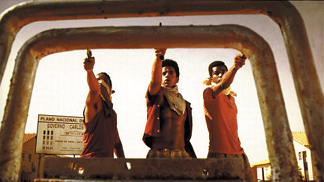City of God
Brazilian baby gangstas
By Jon Popick

"This is a stick up. Nobody move, nobody get hurt."
People familiar with the work of Brazilian filmmaker Fernando Meirelles, who crafted the offbeat comedy Maids, might be floored by his latest big-screen effort. City of God is every bit as violent as Narc, just as gritty as Amores Perros, nearly as relentless as Moulin Rouge, and just as fleshed out as anything Quentin Tarantino has ever made. But Meirelles's picture one-ups those others because it's based on a true story set in a Rio de Janeiro housing project called Cidade de Deus (Bráulio Mantovani adapts the novel which took Paulo Lins eight years to write).
Being dropped into Cidade de Deus is no less intense than what we've experienced in Bloody Sunday or Black Hawk Down. We begin in the late 60s, when the housing project was relatively new (despite having no electricity or paved roads), yet had already succumbed to violent behavior begat by drug use and trade. The focus of the early section of God is on a group of boys called The Tender Trio, and from there, the film follows the lives of two of the Trio over the next few decades.
Rocket (Alexandre Rodrigues) has a bad-ass older brother, but, after quickly learning a life of crime isn't for him, decides to pursue an interest in photography. Lil' Zé (Leandro Firmino da Hora), on the other hand, is rotten to the core and envisions a time when he controls Cidade de Deus like some kind of South American Bill the Butcher. Zé certainly isn't the only hard character in God. Most of them make Hollywood's gun-toting, hip gangsta wannabes look like the cast of Divine Secrets of the Ya-Ya Sisterhood. And there are a ton of them, too.
It's one thing to make a two-plus-hour non-linear film with dozens of characters (each one memorable) that covers nearly 30 years, but it takes a very special filmmaker to do that and, by injecting a little humor in between horrifyingly violent scenes of kids killing kids, flash enough style to warrant comparison to Tarantino, Alejandro González Iñárritu, Paul Thomas Anderson, (a pre-Swept Away) Guy Ritchie and, of course, Martin Scorsese. Meirelles throws everything at the screen but the kitchen sink, using a split-screen, a very likable voiceover and editing style. If the first five minutes of God don't suck you in, it's time to scoop out your eyes and get new ones.
More than once, cinematographer César Charlone shows us the carnage of a battle from overhead (a la the crescendo of Scorsese's Taxi Driver), giving us The Big Guy's perspective of life in the slums. And we get a different, harder-hitting point of view when the closing credits roll, revealing photos of the real-life people on which these characters were based. Meirelles and Co. may have honed their storytelling capabilities with Palace II, a 21-minute Mantovani-penned short about Lin's take on Cidade de Deus. And how's this for a good story: God was filmed in a housing project called Cidade Alta, whose drug trade was run by a guy named Paulo Sergio Magno, who just happened to be arrested in the theatre lobby while attending a special screening of God. Who said films don't make the world a better place?
HOME | THIS ISSUE | ACE ARCHIVES